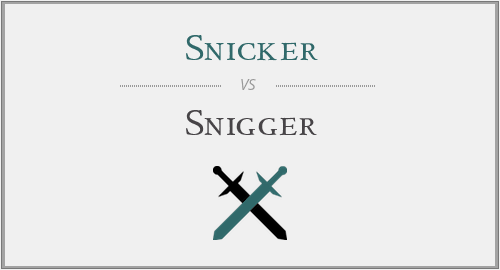Meanings:
Snicker:
The term "snicker" refers to a suppressed or stifled laugh, expressing amusement subtly. It conveys a lighthearted sense of mirth without an overt display. A snicker is often a discreet expression of amusement that does not carry strong negative connotations.
Snigger:
On the other hand, "snigger" describes a smothered or half-suppressed laugh, often accompanied by a sneering or derisive undertone. This term implies a more pointed and potentially scornful expression of amusement, making it distinguishable from the lighter and more neutral "snicker."
Usage Contexts:
Snicker:
"Snicker" finds its home in informal settings where a subtle expression of amusement is appropriate. It is commonly used in everyday conversations, informal writing, and casual contexts. This term is versatile across cultures and does not inherently carry negative implications.
Snigger:
While also utilized in informal settings, "snigger" can be perceived as more mocking or disdainful. It is important to consider the potential negative edge associated with "snigger," making it suitable for contexts where a degree of impoliteness or sarcasm is acceptable, yet not advised in formal or professional communication.

Cultural and Formal Distinctions:
Snicker:
The cultural and formal distinctions associated with "snicker" are relatively subtle. It is a term that, while informal, does not necessarily veer into impoliteness. As such, it is appropriate for a wide array of cultural and professional contexts, albeit with a preference for informality.
Snigger:
Conversely, "snigger" leans towards impoliteness due to its potential for mockery. This term is less suitable for formal or professional communication, as its derisive undertones may be perceived as disrespectful.
Conclusion:
In the intricate dance of language, understanding the nuances between seemingly similar words is crucial. "Snicker" and "snigger" may share a common thread of amusement, but their distinct connotations and appropriate usage contexts set them apart. Whether engaging in light banter or crafting formal communication, the discerning use of these terms enriches linguistic expression, allowing for a more precise and effective conveyance of meaning.




Have a discussion about this article with the community:
Report Comment
We're doing our best to make sure our content is useful, accurate and safe.
If by any chance you spot an inappropriate comment while navigating through our website please use this form to let us know, and we'll take care of it shortly.
Attachment
You need to be logged in to favorite.
Log In